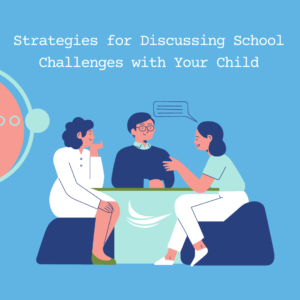Discussing School Challenges with Your Child
 The journey of education is often filled with ups and downs, and it’s natural for children to encounter challenges along the way. As a parent, your role in supporting your child through these hurdles is paramount. Effective communication can be a powerful tool in addressing and overcoming school challenges.
The journey of education is often filled with ups and downs, and it’s natural for children to encounter challenges along the way. As a parent, your role in supporting your child through these hurdles is paramount. Effective communication can be a powerful tool in addressing and overcoming school challenges.
- Create a Safe and Non-Judgmental Environment
When approaching your child to discuss their school challenges, it’s important to create an environment where they feel safe, understood, and not judged. Begin by choosing a comfortable setting that allows for an open and private conversation. Show empathy and reassure your child that their struggles are normal and a part of the learning process. By fostering a safe space, you encourage them to open up and share their concerns without fear of criticism.
- Active Listening
One of the most powerful tools in effective communication is active listening. Give your child your undivided attention when they’re discussing their challenges. Avoid interrupting or offering solutions immediately. Instead, focus on understanding their perspective and emotions. Validate their feelings and let them know that you’re there to listen and support them.
- Ask Open-Ended Questions
Engage your child in the conversation by asking open-ended questions that encourage them to elaborate on their experiences. Instead of asking yes-or-no questions, inquire about specific situations, feelings, and thoughts. For example, ask “Can you tell me more about what happened in class today?” or “How did that situation make you feel?” Open-ended questions encourage your child to express themselves fully and provide valuable insights into their challenges.
- Empower Problem-Solving
Rather than immediately offering solutions, empower your child to become part of the problem-solving process. Ask them for their thoughts on potential solutions or strategies to address their challenges. This approach not only boosts their confidence but also helps them develop critical thinking skills. When children actively participate in finding solutions, they feel a greater sense of ownership over their education and growth.
- Share Your Own Experiences
Relating your own experiences from childhood or sharing stories about overcoming challenges can be incredibly valuable. It shows your child that setbacks are a normal part of life and that even adults face difficulties. However, be cautious not to overshadow their experiences or minimize their feelings by solely focusing on your own stories.
- Celebrate Progress, Not Just Achievements
While achievements are important, celebrating the progress your child makes in overcoming their challenges is equally crucial. Acknowledge their efforts, resilience, and improvements, regardless of the outcome. By focusing on the journey rather than just the destination, you reinforce the idea that growth is a continuous process.
- Collaborate with Teachers and School Staff
Effective communication isn’t limited to parent-child interactions; it extends to collaboration with teachers and school staff. Maintain an open line of communication with your child’s educators to gain insights into their academic progress, challenges, and strengths. Working together with teachers can lead to tailored solutions that address your child’s specific needs.
- Set Realistic Expectations
Help your child set realistic expectations for themselves. Guide them in understanding that challenges are opportunities for growth and improvement. Encourage a growth mindset, emphasizing that with dedication and effort, they can overcome obstacles and achieve their goals.
- Avoid Blame and Judgment
When discussing school challenges, avoid placing blame on your child or others. Instead, focus on understanding the factors contributing to the challenge and finding ways to address them constructively. Shifting the conversation from blame to problem-solving encourages a more positive and solution-oriented mindset.
- Regular Check-Ins
Effective communication is an ongoing process. Schedule regular check-ins with your child to discuss their progress, challenges, and any adjustments that might be needed. This practice reinforces your commitment to their well-being and academic success.
Navigating school challenges can be a transformative experience for both children and parents. By employing these effective communication strategies, you can create a supportive environment where your child feels empowered to face their challenges head-on. Remember that your role as a parent extends beyond providing solutions; it involves actively listening, guiding, and fostering a growth mindset that will serve your child well not just in their education, but throughout their lives.



























